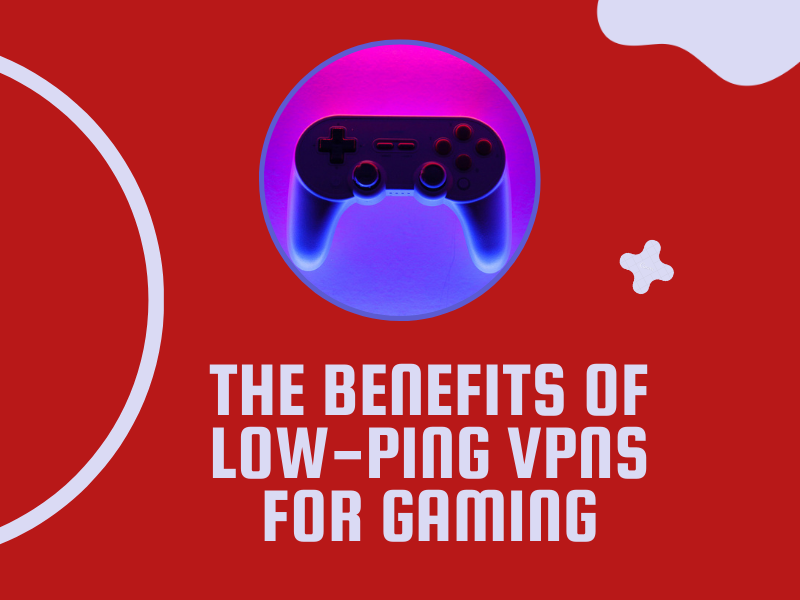INTRO
When it comes to gaming, every millisecond matters. Choosing the right virtual private network (VPN) to ensure low latency is essential for optimal gaming performance. Low-ping VPNs are the best choice for gamers who want to enjoy lag-free gaming sessions. In this blog post, we’ll take a look at the benefits of low-ping VPNs for gaming and how you can use them to get the most out of your gaming experience.
What is Ping?
Ping is the time it takes for a packet of data to travel from one computer to another. It is measured in milliseconds, and it is used to measure the speed of a connection. A low ping indicates a faster connection, while a high ping indicates a slower connection. In online gaming, ping is particularly important because the lower the ping, the smoother and more responsive the game will be. A high ping can cause lag, resulting in unresponsive controls and slow gameplay. As such, gamers often look for ways to reduce their ping to ensure they have the best gaming experience possible.
What are the benefits of low-ping VPNs for gaming?
Low ping VPNs are essential for serious gamers looking to get the best experience out of their games. Lower ping times can result in faster data transmissions, leading to smoother and faster gameplay. With a lower ping, you will also experience less lag and latency issues, which can be extremely annoying and ruin your gaming experience. Low ping VPNs are especially helpful for those playing online multiplayer games, as it allows them to maintain a consistent connection with the game servers and stay competitive with other players.
For gamers who want to play online but have restrictions due to their geographical location, low-ping VPNs can be a great solution. They allow you to connect to a remote server, bypassing any local restrictions that may be in place and allowing you to access content and games that may not be available in your area. Additionally, using a low-ping VPN gives you peace of mind as you can remain secure while accessing blocked content.
Overall, low-ping VPNs are an excellent choice for gamers who want the best possible performance out of their gaming experience. They provide fast data transmission speeds and reliable connections, allowing you to enjoy a smooth gaming experience free of lag and latency issues. Furthermore, they offer an added layer of security and can allow you to access content and games that may not be available in your region.
How do low-ping VPNs work?
Low-ping VPNs are designed to give gamers a better online gaming experience by reducing lag, or latency. When using the internet for gaming, latency is the amount of time it takes for your computer to send and receive data from a server. A low latency connection is desirable because it allows for smoother gameplay and quicker reactions.
Low-ping VPNs work by connecting your computer to a remote server with a lower ping, or latency. This is accomplished by routing your traffic through a server located closer to the gaming server you’re trying to connect to. This process reduces the distance between you and the gaming server, resulting in a lower latency connection.
Additionally, some low-ping VPNs use what’s called “traffic shaping”. This is a technique where bandwidth is adjusted in order to ensure that gaming traffic is given priority over other traffic. This means that if your connection is slow or congested, your gaming traffic will still be able to make it through the network with minimal lag.
By using a low-ping VPN, gamers can get the most out of their online gaming experience. Low-ping VPNs allow gamers to enjoy fast and reliable connections without worrying about lag and latency. Additionally, traffic shaping can help ensure that gamers get the best possible connection no matter how busy the network is.
Are there any downsides to using low-ping VPNs for gaming?
When it comes to using low-ping VPNs for gaming, there are a few potential drawbacks. The first is cost. Because low-ping VPNs are designed specifically for gaming, they can be quite expensive compared to standard VPNs. Additionally, if you’re relying on the VPN to reduce your ping, you’ll have to accept some trade-offs in terms of features and privacy protection. While low-ping VPNs can offer great speeds, they may not offer all the security features of more expensive and secure VPNs.
Another potential downside is that there’s no guarantee that a low-ping VPN will actually reduce your ping or provide the optimal gaming experience. As with any other technology, it’s important to test out different VPNs to find one that works best for you. Finally, there is the possibility that a low-ping VPN could cause latency spikes due to the fact that they often prioritize gaming traffic over other types of data. For these reasons, it’s important to thoroughly research any low-ping VPN before committing to it.
Conclusion
Low-ping VPNs can provide gamers with improved game performance and a smoother gaming experience. With lower latency and less lag, players can enjoy faster response times and better online gaming performance. Additionally, low-ping VPNs can provide additional security and privacy benefits for gamers. While there may be some downsides to using a low-ping VPN, the advantages can often outweigh any potential drawbacks. Ultimately, it is up to the individual gamer to decide if a low-ping VPN is worth the investment.
Read also: Is Gaming Damage Your Laptop?

